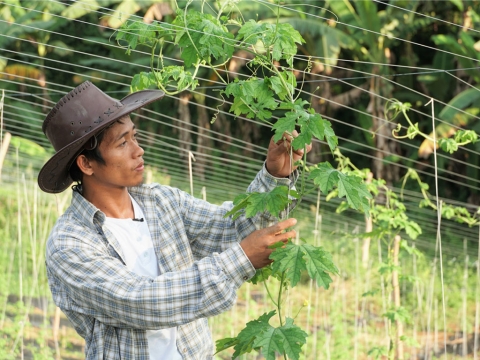As an early riser, Jun visits his farm to inspect his crops such as his field of ampalaya, which he is taking a closer look for harmful insects and signs of plant diseases.
The Filipino farmer is going to be a vanishing breed very soon, and the Philippine government is concerned that this trend could worsen food insecurity with the rising population of consumers to meet current food demand, since the average age of the Filipino farmer is 57.
However, there is a silver lining in Philippine agriculture as young farmers, like Ildefonso “Jun” P. Beltran, are taking up the necessary steps to infuse young blood into agriculture.
Our farmers’ lifetime commitment to till the land to produce food for other people makes them our main source of sustenance. Without farmers, there will be no raw materials to be processed by big industries. The upcoming problem of aging farmers is most certainly concerning in terms of ensuring successful and efficient food production in the future.
In order to solve this issue, the Philippine government through the Department of Agriculture (DA) is taking various initiatives in order to attract younger demographics towards agriculture by providing grants and scholarship programs, counterparting young people to start their own agribusiness enterprise, and giving all the tools necessary such as training through the Agricultural Training Institute (ATI) in order to slowly incorporate young adults to develop a robust future via agriculture.
Passion for Food
At 28, Jun P. Beltran of Beltran Farm in Barangay Rosario, Tagoloan, Misamis Oriental is already a pro at farming for food consumption...and for profit.
Since he started farming in 2009, his farming venture had already brought him a fortune through his 1.5 area farm teeming with high value crops such as an eggplant area, a greenhouse area for romaine lettuce, kangkong, tomatoes, chili, string beans, sweet basil, bell peppers, banana, coconut, squash, ampalaya, and almost everything that were mentioned in our traditional folk song “Bahay Kubo”.




Although he observed the current young generation has little or no interest in agriculture, Jun found out through social media that they are interested and passionate about food. As far as millennials are concerned, Jun thinks that “food is life.” He added that agriculture must be treated as a field and sector of many opportunities.
“Everytime naa koy training nga ma-apilan, ako nang gina-apply dere sa akong farm.” (Everytime I got the chance to attend and participate a training, I apply it on my farm), Jun said.
“It is because of my 40 thousand to 50 thousand income from selling vegetables that I was able to expand my farm and produce more vegetable production area. My biggest earner lately is my lettuce through hydroponics”, Jun said further.

Jun started small by concentrating in one plot and one project at a time. His persistence and dedication to farming made it possible for him to attend various trade fairs and agri-fairs in the metro.
Aside from sheer determination and hard work, Jun acknowledged that his farming venture was also made possible by the involvement of the ATI, Municipal Agriculture Office, Provincial Agriculture Office, and DA.
Supporting Young Farmers via Government Training Programs
Training is an effective means to support young people who are not knowledgeable enough about agriculture and farming. Programs like the Young Filipino Farm Leaders Training Program in Japan (YFFLTPJ) do a great job at providing all the necessary agriculture coaching for the young farmer recipients.
YFFLTPJ is a commitment of the Japanese government to ASEAN regions through the Japan Agricultural Exchange Council (JAEC) and the Japan Ministry of Agriculture Forestry and Fisheries (MAFF).
Jun was a program recipient way back in 2018, as he was one of the qualifiers sent to Japan for an 11-month farm immersion in Japan.
“One of the most common issues that create resistance for young people to get into farming and agribusiness is being clueless where to start. The young generation of today lack the understanding on how farming is directly related to the development of our economy. Young people must understand that they can make an impact regarding the future of food production.” Jun stressed.

The said program also aims to foster exchanges with young farmers’ organizations in the host country at the same time promote mutual cultural understanding and friendship through personal contacts with the Japanese farmers in the local communities.
Enticing the Youth to engage in Agriculture
Through modern technology and with the younger generation gaining every day perspectives, the current direction of agriculture in the Philippines is geared towards making it more attractive and more appealing to the youth.
“Dili nato batasanon nga kung ma-failure, mu-undang ta” (We should not make it a habit to quit whenever we fail) Jun shared, stressing the importance of resilience.

“I had my fair share of failures in the past since during my early years in farming, I did not know how the middle men or the buyers work. Most of the time, when inexperienced farmers would go to them, they would be met with different “circumstances” which they end up selling their farm produce in a very cheap price.
The agriculture industry of Philippines is now quite aggressive in not only providing stable and affordable food for Filipinos. Its goal had escalated into making sure everyone gets to be interested and to participate in agriculture.

For Jun P. Beltran, each abundant harvest does not only celebrate and honor the existing workers in the agriculture sector but as well as encouraging the youth that there is money and things that needs to be learned in the agri-sector.
Pushing farmers to even work harder, Jun stressed that there is money in farming. Farms when managed properly promise to give profitable returns, and this is what the Department of Agriculture - Agricultural Training Instiute is prioritizing. Through proper training coupled with technology, agricultural production is increased which brings profitable income to our farmers.
For more of Jun Beltran’s hydroponic technology, you can watch the YouTube video here: https://www.youtube.com/watch?v=QVYbzS6nnNM


